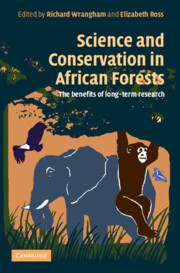Book contents
- Frontmatter
- Contents
- List of contributors
- Foreword
- Preface
- Acknowledgments
- 1 Why the link between long-term research and conservation is a case worth making
- 2 Links between research and Protected Area management in Uganda
- 3 The use of research: how science in Uganda's National Parks has been applied
- 4 Long-term research and conservation in Kibale National Park
- 5 Monitoring forest–savannah dynamics in Kibale National Park with satellite imagery (1989–2003): implications for the management of wildlife habitat
- 6 Long-term studies reveal the conservation potential for integrating habitat restoration and animal nutrition
- 7 Long-term perspectives on forest conservation: lessons from research in Kibale National Park
- 8 Health and disease in the people, primates, and domestic animals of Kibale National Park: implications for conservation
- 9 The importance of training national and international scientists for conservation research
- 10 Community benefits from long-term research programs: a case study from Kibale National Park, Uganda
- 11 Potential interactions of research with the development and management of ecotourism
- 12 The human landscape around the Island Park: impacts and responses to Kibale National Park
- 13 Conservation and research in the Budongo Forest Reserve, Masindi District, Western Uganda
- 14 Long-term research and conservation in Gombe National Park, Tanzania
- 15 Long-term research and conservation in the Mahale Mountains, Tanzania
- 16 The contribution of long-term research by the Taï Chimpanzee Project to conservation
- 17 The Green Corridor Project: long-term research and conservation in Bossou, Guinea
- 18 Long-term research and conservation of the Virunga mountain gorillas
- 19 Long-term research and conservation of great apes: a global future
- 20 Long-term research and conservation: the way forward
- Index
Preface
Published online by Cambridge University Press: 06 July 2010
- Frontmatter
- Contents
- List of contributors
- Foreword
- Preface
- Acknowledgments
- 1 Why the link between long-term research and conservation is a case worth making
- 2 Links between research and Protected Area management in Uganda
- 3 The use of research: how science in Uganda's National Parks has been applied
- 4 Long-term research and conservation in Kibale National Park
- 5 Monitoring forest–savannah dynamics in Kibale National Park with satellite imagery (1989–2003): implications for the management of wildlife habitat
- 6 Long-term studies reveal the conservation potential for integrating habitat restoration and animal nutrition
- 7 Long-term perspectives on forest conservation: lessons from research in Kibale National Park
- 8 Health and disease in the people, primates, and domestic animals of Kibale National Park: implications for conservation
- 9 The importance of training national and international scientists for conservation research
- 10 Community benefits from long-term research programs: a case study from Kibale National Park, Uganda
- 11 Potential interactions of research with the development and management of ecotourism
- 12 The human landscape around the Island Park: impacts and responses to Kibale National Park
- 13 Conservation and research in the Budongo Forest Reserve, Masindi District, Western Uganda
- 14 Long-term research and conservation in Gombe National Park, Tanzania
- 15 Long-term research and conservation in the Mahale Mountains, Tanzania
- 16 The contribution of long-term research by the Taï Chimpanzee Project to conservation
- 17 The Green Corridor Project: long-term research and conservation in Bossou, Guinea
- 18 Long-term research and conservation of the Virunga mountain gorillas
- 19 Long-term research and conservation of great apes: a global future
- 20 Long-term research and conservation: the way forward
- Index
Summary
Global climate change has always been a challenge to species survival and, of course, evolution and extinction are driven in large measure by adaptive strategies that are triggered by habitat pressure and the loss or gain of opportunities. Today, those of us concerned with nature conservation are confronted by the onset of massive and rather rapid environmental changes, accelerated if not caused by human activity, past and current. I do not think there has been any time in the past where, in the human context, climate change has had such enormous and recognized implications for a world that we arrogantly consider ours.
Those of us who concern ourselves with the broad task of species survival have relatively few tools at our disposal in the face of such a gigantic challenge. There are, however, some things that are being done and perhaps more critically, could be done. Sharing knowledge and collaborating on an interdisciplinary and international basis is fundamental. Science may not have all the answers but it certainly offers a framework for strategic planning.
In some cases, perhaps little can be done to stop habitat loss but I sincerely believe that the concept of conservation remains valid and much that is going wrong can, in fact, be put right. Forests are particularly important and, along with wetlands, are probably the most important for the consideration of policy makers and the population at large.
- Type
- Chapter
- Information
- Science and Conservation in African ForestsThe Benefits of Longterm Research, pp. xix - xxPublisher: Cambridge University PressPrint publication year: 2008



